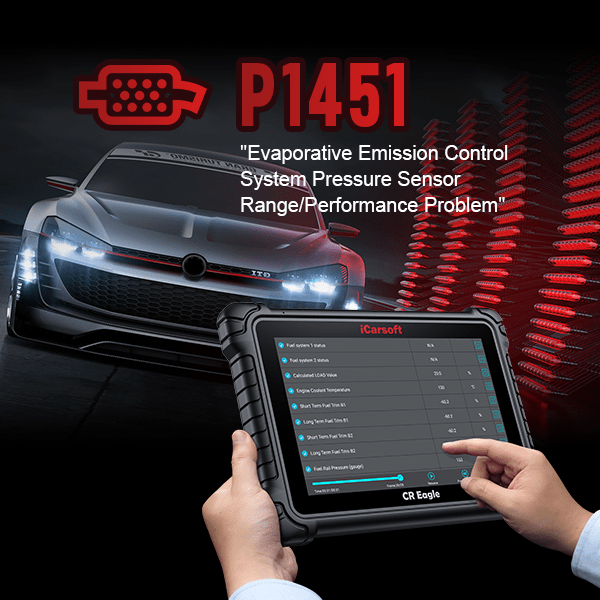OBD-II Code P1451: What It Means and How to Fix It
The P1451 trouble code is a manufacturer-specific DTC (Diagnostic Trouble Code) related to the Evaporative Emission Control (EVAP) system. If your OBD2 scanner shows code P1451, your car's computer has detected a malfunction involving the EVAP vent control circuit. Let's explore what this means, common symptoms, causes, how to diagnose it, and most importantly, how to fix it.
🚨 Common Symptoms of P1451
- Check Engine Light is ON
- Failed emissions test
- Fuel odor near the fuel tank or filler neck
- Reduced fuel economy in rare cases
🔍 Possible Causes of P1451
- Faulty EVAP canister vent solenoid valve
- Clogged or damaged EVAP canister
- Broken or shorted wiring in the EVAP control circuit
- Failed powertrain control module (PCM)
🛠️ How to Diagnose P1451
- Use a bi-directional scan tool like iCarsoft CR Max or CR Eagle to run EVAP tests.
- Command the vent solenoid open/closed and listen for clicks.
- Visually inspect EVAP wiring and connector for damage or corrosion.
- Use a multimeter to check resistance of the solenoid valve.
- Inspect the charcoal canister for clogging or fuel saturation.
🔧 How to Fix Code P1451
- Replace the faulty EVAP canister vent solenoid valve
- Repair or replace damaged EVAP circuit wiring
- Clean or replace the charcoal canister
- Clear the code with a scan tool and retest the EVAP system
Recommended Tool: iCarsoft CR Max or CR Eagle
To properly diagnose and test the EVAP system, we recommend using a full-featured scan tool like:
Both tools offer bi-directional control and special EVAP system diagnostics for most Ford, Lincoln, Mercury, and other makes.
Related Blog Posts
Frequently Asked Questions (FAQ) about Code P1451
🔧 Q1: Can I drive my car with code P1451?
A: While P1451 usually doesn’t cause immediate drivability issues, it indicates a fault in the EVAP system that affects emissions. Driving short-term is fine, but you should fix it soon to pass inspections and avoid worsening the problem.
💡 Q2: What causes code P1451?
A: The most common causes include a stuck EVAP vent solenoid, damaged wiring, a faulty charcoal canister, or ECM software issues.
🧰 Q3: What’s the easiest way to diagnose this code?
A: Use a bi-directional OBD2 tool like the iCarsoft CR Max or CR Eagle to command the EVAP solenoid, test fuel tank pressure, and run leak tests in real time.
📅 Q4: Do I need to replace parts or just reset the code?
A: It depends. If the EVAP solenoid or wiring is damaged, replacement is required. If the system is functional and the code was triggered by a temporary fault (like overfilling the tank), you may just need to clear the code and monitor.
🔄 Q5: Will the code clear itself?
A: In rare cases, yes—but only if the underlying issue is resolved and the EVAP system passes self-monitoring over several drive cycles. Using a scanner to clear it manually is faster and more reliable.













